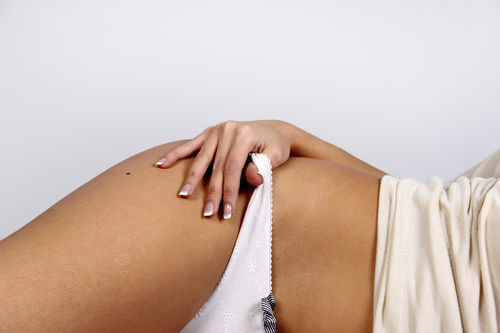4 ways to have a healthy vagina
- Posted on
- Comment
 We all know tips and tricks for getting healthy hair and skin, but what about having a healthy vagina? Most women are taught early on to cleanse daily with strong soap or use “feminine hygiene” sprays, but this can actually do more harm than good. Knowing the right way to stay clean, choosing foods that will boost your health, and even exercising your vagina are all ways you can keep your vagina in tip top shape. Read on to learn more about how to have a healthy vagina.
We all know tips and tricks for getting healthy hair and skin, but what about having a healthy vagina? Most women are taught early on to cleanse daily with strong soap or use “feminine hygiene” sprays, but this can actually do more harm than good. Knowing the right way to stay clean, choosing foods that will boost your health, and even exercising your vagina are all ways you can keep your vagina in tip top shape. Read on to learn more about how to have a healthy vagina.
Part 1 of 4: Keeping Your Vagina Clean
-
1
Wash with hot water only. It may seem counterintuitive, but washing your vagina with soap, whether it’s bar soap or liquid, isn’t the best way to keep clean. The vagina actually stays quite clean on its own without the help of outside cleansers.[1] Like other parts of the body, the vagina has a pH level that needs to be maintained within a certain range – 3.5 and 4.5, to be specific – in order to prevent the growth of unhealthy bacteria and facilitate the growth of good bacteria. Using harsh cleansers can upset the balance, leading to infection, irritation, and even bad smells.
- People often refer to the entire area “down there” as the vagina, but remember that the vagina is actually the tube-like muscle located inside your body. The vulva, the skin outside the vagina, may be cleansed with no-frills bar soap, as long as you don’t find that it irritates your skin.
- If you do end up washing your vagina with soap, make sure to thoroughly rinse it with warm water so that no traces of soap are left behind. Soap left inside the vagina can cause irritation.
Don’t use douches or feminine sprays. Douching with chemicals that are supposed to make your vagina smell like a field of flowers actually ends up having quite the opposite effect.[2] They wash out all the healthy bacteria that helps your vagina stay clean and infection-free. The chemicals left behind by douches can cause irritation and even burning, and the same goes for feminine sprays. If you keep your vagina healthy using other methods, there will be no need to try to make it smell different.
- Scented creams marketed as a way to change the smell of your vagina can cause the same problems, so these should also be avoided. The same goes for scented pads and tampons and scented wipes.
- If you feel like you absolutely have to use a scent on your vagina, go for something completely natural and chemical free. You can make your own body spray by mixing a few drops of an essential oil like rose, lavender or lemongrass with water in a spray bottle. Use the body spray after showering, and make sure you’re completely dry before getting dressed.
Have good hygiene during your period. Many women experience an increased rate of vaginal infections when they’re menstruating, since having blood in the vagina changes its pH and throws things out of balance. To stay healthy during your period, practice the following habits:
- Change your tampon frequently. Tampons absorb menstrual blood, and if you leave them in too long, you’re keeping the blood in your vagina where it can change your pH. Make sure you change your tampon every few hours to keep this from happening.
- Don’t use pads or panty liners for longer than necessary. Wearing pads and panty liners all month long or after your period is over can lead to skin irritation.
- Consider getting a menstrual cup. These rubber cups are inserted in the vagina to catch the blood, then rinsed out with hot water every few hours. Menstrual cups are a chemical-free choice for handling your period, and they can be really helpful if you tend to get irritated by tampons and pads.
-
4
Wipe from front to back. It’s important to wipe from front to back, rather than the reverse, to keep fecal matter from entering your vagina and causing an infection. Use plain, unscented toilet paper to wipe. Avoid using wet wipes or any other product that contains perfumes and chemicals.
Part 2 of 4: Adopting Healthy Lifestyle Habits
- Wear loose-fitting clothing. Stretch pants, skinny jeans, and tights trap moisture against the skin and prevent airflow, often leading to yeast infections. Try wearing looser, lighter fabrics that breathe well. Go for skirts and dresses more often, and choose thigh-high tights instead of the kind that pull up around your waist. Pick out shorts that are on the looser side, too.
-
3
Change out of wet clothes right away. Wearing a wet bathing suit or wet workout clothes for a few hours leaves you prone to getting a yeast infection. Make sure you change into clean, dry underwear as soon as possible after swimming or working out. You might even want to keep an extra pair on hand for unexpected situations when you might find yourself in need of a fresh pair.
Have good grooming habits. Keeping your pubic hair long can help create the moist, warm environment that bacteria need to grow, increasing the chances that you’ll get an infection. There’s no need to go totally bare, unless you want to, but it’s a good idea to use a small scissors to carefully trim the hair back to a shorter length so that the area is easier to keep clean and dry.
- If you decide to shave the area around your vagina, be very careful not to cut yourself with the razor. Use shaving cream (making sure not to let any get inside your vagina) and take your time shaving around the folds so you don’t accidentally get hurt.
- Waxing is another option that many women choose. If you go this route, make sure you do some research and choose a reputable waxing salon that uses clean products and wax. Waxing salons with unsanitary practices can cause the spread of bacterial infections.
Wash after sex. When you have sex with a partner, you’re opening yourself up to bacteria and other microscopic substances that can end up irritating your vagina and causing an infection. The solution? Wash your vagina with hot water after sex. This will greatly minimize the chance that your encounter will have an unpleasant after effect.
- Asking your partner to wash before sex is also a good idea, especially if you aren’t using condoms.
- Washing other body parts before sex can be helpful, too! If you’re especially prone to getting infections, try taking a shower with your partner before having sex to minimize the risk that you’ll end up with unhealthy bacteria in your body.
- Use dental dams and gloves as an extra form of protection if you receive oral sex or are being fingered.
Pee after sex. At the very least, pee after sex, even if you intend on washing, too. When you have sex, unwanted bacteria can travel up the urethra, which is connected to your bladder. Peeing after sex can help flush the bacteria out of the vaginal area, promoting general health and helping you avoid those pesky
-
7
Try using condoms. The pH of semen is basic, whereas the pH of the vagina is acidic. When semen is left in the vagina after sex, it upsets the balance in the vagina, leaving it prone to bacteria growth. Using condoms or another barrier method eliminates this problem. If you don’t want to use condoms, wash the semen away right after sex so it doesn’t have time to change the pH of your vagina.
Part 3 of 4: Eating Well and Exercising
Eat plenty of yogurt. Yogurt has the same kind of “good” bacteria that your vagina needs to stay healthy.[5] You can replenish your body’s bacteria by making yogurt part of your daily diet. Eating yogurt is a great way to both prevent and treat yeast infections.
- Other foods besides yogurt also help your body in this way. Kimchi, kombucha, and other fermented foods can be substituted for yogurt if you aren’t a big fan.
- Yogurt pills are also available if you’d prefer not to ingest yogurt on a daily basis.
-
2
Eat lots of fruit. Cranberries, pineapples, strawberries, and other fruits help to freshen the smell of the liquids secreted by the vagina. Eating fruits won’t exactly make your vagina smell fruity, but it can help you develop a more pleasant scent if that’s something you’re concerned about. Fruit also has a high water content, and staying hydrated helps flush the body of toxins that can lead to bad smells.
-
3
Eat garlic. Garlic has properties that kill yeast, making it an effective tool for preventing and treating yeast infections. Eating cooked or raw garlic a few times a week is a great way to keep your vagina healthy. It has also been said to help get rid of bad vaginal odor.
-
4
Do kegel exercises. Kegel exercises strengthen the pelvic floor muscles and the pubococcygeus muscle. These muscles tend to get looser and weaker with age and after giving birth. Strengthening them can help you avoid issues like urinary incontinence and also increase sexual pleasure.[6] To do kegal exercises, follow these steps:
- Locate your pelvic floor muscles. To do this, pretend you are stopping urinating in midstream. The muscles you use to stop are the ones you are targeting with kegels.
- Tighten the muscles and hold for three seconds, then release. Repeat this 15 times.
- Continue doing kegel exercises daily, holding for longer and adding more repetitions as you gain control.
-
5
Explore other ways to exercise the vagina. The vagina is also strengthened through sexual activity and pleasure, since sex keeps it toned and elastic. Having regular intercourse is a good way to keep yourself in shape. Focus on tightening and releasing the vagina during sex to exercise the vagina as much as possible.
- Using a vibrator can help you achieve the same effect.
- Jade eggs, vaginal cones, ben wa balls and vaginal barbells are also implements designed to exercise the vagina through “weight-lifting” techniques.[7]
Part 4 of 4: Dealing With Infections and Other Ailments
Try over-the-counter remedies for yeast infections. Most women experience yeast infections now and then, and they can usually be combatted with over-the-counter antifungal creams or suppositories. The treatments come in doses that are taken over a period of 1, 3, 5, or 7 days, depending on how severe your infection is. Most yeast infection treatments also come with anti-itch cream that can be used to help with itching and burning around the vulva area.[8]
- If you aren’t sure that what you have is a yeast infection, you should see a doctor to double check. Yeast infection symptoms include curd-like, yellowish discharge with a bad smell, itching and burning in the vaginal area, a rash on the vulva, and burning or soreness.
- If your infection still won’t go away after a week or so, make an appointment with your doctor to get prescription medication that will wipe out your infection.
- You can also try doubling your daily intake of yogurt or other fermented foods to increase the levels of “good” bacteria in your body.
-
2
Go to the doctor to get treated for vaginitis. Vaginitis can be caused by yeast infections, bacterial infections, parasites, and other causes. It’s characterized by a discharge with a fish-like odor, burning and itching, and a rash around the vulva. You can buy over-the-counter creams to combat the uncomfortable symptoms, but you should go to the doctor to figure out the cause and receive a prescription as necessary.[9]
-
3
Get regularly tested for STDs. Sexually transmitted diseases such as HPV, chlamydia, genital warts, and others can cause long-term damage if left untreated. If you have unprotected sex and feel there’s a possibility you could have contracted an STD, make an appointment with your doctor or go to a health clinic. In many cases you’ll be able to get free testing.
-
4
Go to the doctor if you notice something out of the ordinary. Many women aren’t familiar with the way their vaginas look and feel, so they aren’t aware when something changes. Every vagina is different, and it’s important to know how your vagina normally looks, feels, and smells so that when something changes, you’ll notice and seek medical attention if necessary. Go to the doctor if you notice a stark change in color, warts or other bumps, discharge that smells or looks different, or if you have pain in your vagina.
-wikihow










 (Selorm) |
(Selorm) |  (Nana Kwesi)
(Nana Kwesi)